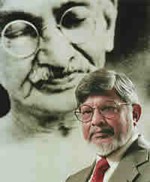|
Arun Gandhi, the fifth grandson of Mahatma Gandhi, is the Founder/President of the
M.K Gandhi Institute for Nonviolence
in Memphis, Tennessee. The Mission of the Gandhi Institute is to promote and apply the principles of nonviolence locally, nationally, and globally, to prevent violence and resolve personal and public conflicts through research, education, and programming.
|
|

|
|
Many years ago Gandhiji told a correspondent that Ahimsa is not nonviolence, it is love, respect, understanding and appreciation. So, today when we ask the question is Ahimsa relevant we are in fact asking is love, respect, understanding and appreciation relevant. If we conclude that ahimsa is not relevant then we will negate civilization because a society that has no love, respect, understanding or appreciation for anybody or anything cannot be considered civilized.
The mistake we make is to become literalists. We translate ahimsa to mean nonviolence and nonviolence to mean the opposite of violence. I have deliberately removed the hyphen in “nonviolence” to eliminate the negativity attached to the word. Nonviolence without the hyphen becomes a word that stands on its own and, therefore, assumes a positive aura. To believe in and practice nonviolence one has to nurture the good within each of us and allow feelings of respect, understanding, love, compassion and consideration to dominate our attitude. Without these positive attitudes becoming nonviolent is virtually impossible. On the other hand, I consider violence as negative because it evokes all negative feelings like anger, hate, prejudice and in order to kill one has to dehumanize oneself.
Through his unique interpretation of ahimsa Gandhiji conceded that life cannot be totally nonviolent and rejected the absolutist attitude of the Jains. When Gandhiji asked the Jain Muni Raichandji what would he do if a snake threatened to bite you or your child the Muni’s reply was that a true Jain would do nothing to harm the snake. Gandhiji said that was hard for him to accept. However, this does not mean that we do not aspire to attain the highest level of nonviolence we are capable of. We must set ourselves high goals and attempt to reach those goals to the best of our ability in order to create a truly civilized society.
I disagree with those who believe nonviolence is a strategy for conflict resolution. I believe it is a way of life that we have to constantly strive to achieve. In its broader sense ahimsa is about building relationships that are based on positive principles of love, respect and understanding and not for selfish reasons. The two primary reasons for conflict today is anger and selfish relationships. At all levels we are moved to anger, lose control of our minds and resort to violence; and, second, that our relationships almost at all levels are built on selfish, self-centered principles. Today we are constantly trying to get something out of each other and when we fail we break off the relationship causing distress and conflict.
The root of violence that we experience today in every part of the world is buried in the Culture of Violence that we have adopted to protect the profoundly materialistic way of life. The more one possesses the more one needs to protect and that feeds the culture of violence. This attitude also leads to a distorted sense of nationalism. We are proud of who we are, which is good, but when we take that pride to the next level of protecting our identity and our country then we are swimming in dangerous waters. As individuals and as nations we are all inter-connected and, as Dr. Martin Luther King, Jr., said “What happens to one, eventually happens to all.” There is no way a country can secure itself from the rest of the world. However strong or rich the United States may be but if the world perishes it will perish with it. This is why I believe the United States has gone about the business of eliminating terrorism the wrong way.
Through violence the United States is creating more terrorists around the world than eliminating. Evil is not a person, it is an idea, a thought, and while one can kill a person who believes in evil thoughts and ideas one cannot destroy evil itself. World War II was fought to eliminate hate and prejudice that manifested itself in the attitudes of Hitler and the Nazis. Cumulatively, the world sacrificed 60 million human lives and yet the hate and prejudice continues to thrive and threaten us. Violent solutions are, at best, temporary and because violence depends so heavily on the element of “fear” for its success one has to keep escalating violence until, as at present, it reaches mind-blowing proportions. I venture to conclude with the prediction that if we persist with the present culture of violence what we will experience in the future will be many times worse than what we are experiencing today.
A super-power is not one that has the most, and the deadliest, weapons of mass destruction but the people-power when they realize the power of love and respect. The Soviet Union and the eastern bloc countries of Europe collapsed when the people decided they wanted a peaceful change and went into the streets to hug soldiers and stuff their guns with flowers and bouquets. Weapons can kill people but they cannot destroy the power of good or the power of evil. Peace will come when people stop killing each other and start nurturing good ideas and philosophies.
|



